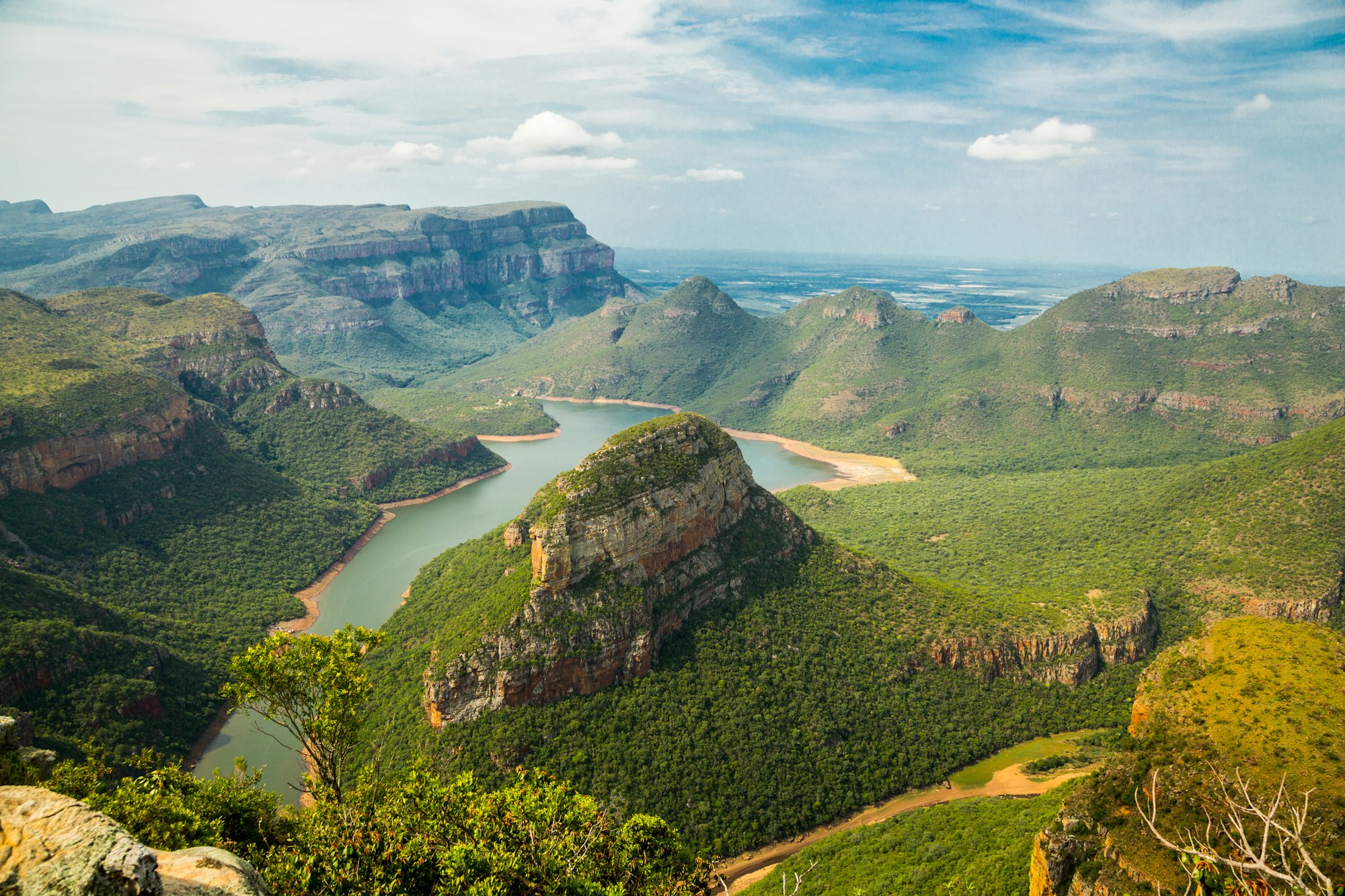Cardano & Africa: A Look into the Future
As we approach the Africa Special event on April 29th, we wanted our readers to fully grasp just how big this deal could be; how Cardano can actually weave it's way into the fabrics of Sub-Saharan government, infrastructure, and...


As we approach the Africa Special event on April 29th, we wanted our readers to fully grasp just how big this deal could be; how Cardano can actually weave it's way into the fabrics of Sub-Saharan government, infrastructure, and — most importantly — it's people.
This post should be read mainly as a thought experiment, where we draw out potential solutions (to current problems being faced) using Cardano's platform, products, and applications.
We're going to craft a world in which you will experience life as a small-hold farmer in a remote village in Ethiopia. You will be immersed with the day-to-day struggles of a small-hold farmer, the current infrastructure that fails to meet the needs of your family and your business, and an un-incentivized government unable to attract sustainable investments.
In Africa, agribusiness, more than any other sector, has the potential to reduce poverty and drive economic growth. Agriculture accounts for nearly half of the continent’s gross domestic product and employs 60% of the labor force.
Let's begin...
The Problem
You are a smallholder farmer, named Kamali. You and your family of 4 run a wheat farm in the Woinima village of the Jabi Tehnan district of Ethiopia. You collect irrigation water from an upstream river called Guisa once every 4-6 weeks to water your farm.
You own 1.75 hectares of land and want to expand, but the amount of water irrigated to you is only enough to support .5 hectares of wheat production and is inconsistent and unreliable.
With inconsistent and minimal delivery of water to your farm it is impossible to expand, which is essential for the survival of your family. You're stuck; limited.
Irrigation is the most crucial aspect in the expansion of the agricultural sector in Sub-Saharan Africa, and particularly Ethiopia, in which irrigation accounts for just 3% of food crop production — the lowest in Africa.
Here are some reasons why irrigation is hard to implement for small-scale farmers like Kamali:
- Low input supply (supply of fertilizer/pest control products)
- Lack of credit for basic financing
- Capital fraud
- Lack of post-farming supply chain systems
- Access to reliable electricity
Furthermore, according to the World Bank, Ethiopia's weak points in terms of investment attractiveness are detailed:
- Vulnerability to climate conditions and changes in world commodity prices
- Isolation; Ethiopia is landlocked
- Insufficient level of foreign exchange reserves
- Some difficulties in the business and governance environment
- An unstable regional context (a national one in the last period, with protests from the Oromo ethnic group)
- Exchange rate volatility
- The fact that ethnic conflicts (often arising from the use of resources and land disputes) occasionally become violent
Looking at this, one can deduce that the ensuing lack of access to capital at all levels — local, regional and state — is the main driver of poor irrigation infrastructure. How can this infrastructure thrive if investment capital has high barrier-to-entry due to poor state-level policy, regional-level trust, and local-level identity?
You secure local-level customers from state-level jurisdiction, then restructure from the local-level and watch the solution cascade back upward.The center of our problem here is financial inclusion; how do we get investment capital to trust that their money will not only yield a return, but will also avoid being defrauded, breached, or stolen? In such a loosely regulated, non-secure and high-risk market, how do you ensure trust?
The same way you establish trust with anyone — you get to know them.
Enter Atala PRISM
Atala PRISM is a decentralized identity solution built by Cardano that enables people to own their personal data and interact with organizations seamlessly, privately, and securely.
Using Atala PRISM as an identity layer to restructure how local-level actors (like Kamali) interact with important endpoints in a supply chain could work like this:

1. Onboarding
Kamali is on-boarded to Atala PRISM via the mobile-app which holds secure data, including:
- Her personal information (KYC / AML)
- Credit score
- Occupation (small-hold farmer)
- Type of crop (perishable or non-perishable)
- How much yield the farm produces
- What type of inputs needed
- How much water needed
2. ATA Verification
Kamali is verified by an Agricultural Extension Officer sent out by the Ethiopian Agriculture Transformation Agency (ATA) that the information about her farm is correct.
3. A Credit Voucher
After being verified, Kamali requests a credit voucher from a financial institution that is also verified by the ATA. Per the terms, Kamali must pay back this credit voucher within 12 months.
4. Purchase Inputs
Kamali uses that credit voucher to purchase inputs from an agro-dealer or cooperative (supplier of farming inputs) — who is also verified by the ATA — at a subsidized rate.
5. Agro-Dealer Verification
The agro-dealer checks the verification process and upon confirmation and, upon successful verification, grants the inputs requested by Kamali.
6. Aggregation
The agro-dealer takes the voucher and aggregates them with thousands to millions of other vouchers to give back to the financial institution to collect their margin.

Now you have a trust-based infrastructure in play that lives completely on the Cardano blockchain. The implications are enormous. It means auditing the life cycle of vouchers, credit, inputs, and smallholder farm production is no longer an issue because information is transparent, immutable and non-corruptible.
But how do we know the people verifying others will not be corrupt? The answer is almost boringly simple: incentives.
- Kamali’s incentive is to receive inputs to produce yield, so she will pay her loans off.
- The agro-dealers incentive is to make margin on credit vouchers, so they will maintain input supply.
- The ATA's incentive is to increase productivity, so they will verify trusted actors in the supply chain.
- The Government of Ethiopia’s incentive is to procure foreign investment, so they will audit the blockchain routinely.
With our newly upgraded supply-chain, production begins increasing, fraud is mitigated, and food scarcity decreases!
The Government of Ethiopia can more aggressively shop for Foreign Direct Investment (FDI), and can even negotiate better rates. With FDI inflows increasing, the Government of Ethiopia begins hiring engineers, irrigation technique counselors, contracting out developers and suppliers, and restructures Kamali’s current irrigation channel.
 Currently dropping since 2014.
Currently dropping since 2014.The Other Problem
You have been having your best production yields ever recorded; you have been building up your credit and are now financing your own electrically powered irrigation pump that has much better access to water due to larger irrigation installments upstream.
You are now able to expand the amount of wheat coverage from .5 hectares to all 1.75 hectares that you own. However, this means your input costs will increase by 250%. The current financial institutions aren't yet comfortable issuing an unsecured credit voucher of that size to you.

Your current alternative is to outsource a loan from the current Web2 centralized finance (CeFi) infrastructure via the mobile app, Opay — a borrow/lending platform in Ethiopia.
Unfortunately, Opay was demanded to be taken off of Google Play Store for predatory lending as their practices included massive data breaches, including:
- Internet browser history
- Social media
- SMS and call history
- Location data
Their predatory lending tactics included schemes like:
- High loan origination fee (upwards of 22%)
- Massive APR (upwards of 300%)
- Short term fixed duration(not suitable for farmers)
For obvious reasons, you cannot afford a 22% loan origination fee and don't want to consent to such invasive privacy access, you seem to be out of options.
Enter Liqwid Finance

Liqwid Finance will be the first on-chain money market borrow/lending application on Cardano. This will enable anyone with ($ADA/$ERG/$SigUSD) to engage as a lender/supplier in the market to earn interest or to borrow against their assets.
The dismissal of custody, settlement, and escrow — heavy fixed costs that are built into the legacy CeFi system — and the introduction of algorithmically optimized money lowers the fees charged to perform key banking actions.
What this looks like for Kamali is a loan origination fee ~100x smaller at .25% compared to her current CeFi incumbent, Opay (currently at 25%).
Liqwid will be working on ‘credit concepts’ that will enable a completely decentralized, on-chain credit scoring system which will allow for dynamic, algorithmically set interest rates that will incentivize borrowers like Kamali to make her loan payments on time.
A Better System
You (Kamali) have now secured financing and can borrow against your new found liquidity to obtain the credit voucher you were previously denied by the financial institution; the credit voucher allows you to pay a subsidized rate for inputs, usually 60%.
Your demand for expansion has now been met and you begin harvesting wheat and other crops on all 1.75 hectares. And guess what? Your entire village and other villages around you start taking the same approach.
Now the aggro-dealers are struggling to keep up with the new demand as their source of funding (financial institution + regional government) doesn't have the capital to pay importers, suppliers, and input producers.

Now that FDI are at all time highs, how and where do we introduce more liquidity to keep up with growing input demand?
While the financial bottle-necking in Ethiopia forces illiquidity and further expands financial exclusion from capital on-ramps across the globe, the bridge to this is being built in DeFi and with the introduction of tokenization could provide liquidity to the near 5 trillion dollars in illiquidity that exists in Africa.
 Africa currently provides 5% of global GDP share but receives a little over 1% of global capital.
Africa currently provides 5% of global GDP share but receives a little over 1% of global capital.Currently, the financial institutions that distribute credit vouchers are backed by regional governments through the Commercial Bank of Ethiopia, but most credit and cash sales are collected and facilitated by the financial institutions themselves — therefore mitigating budget risks for regional governments.
These individual vouchers are 100% sovereign-backed and have a 90% repayment rate with a 15% interest.
While these vouchers are small individually, what if it was possible to tokenize them, aggregate them, and then create tranches based off of crop, harvest-rate, and seasonal production (which have maturation dates built in to provide investors varied risk profiling)?
You could call these debt instruments SBS’s or (sovereign-backed securities) and they would live on the Cardano blockchain and could be sold to hedge funds, investment banks, or individual investors in the Cardano ecosystem.
 Example of a traditional tranche package able to be marketed to various clientele with various risk profile and access to capital.
Example of a traditional tranche package able to be marketed to various clientele with various risk profile and access to capital.Capital inflows to the financial institutions are pouring in and they can now fund the growing demand for agricultural inputs from suppliers. Agro-dealers and cooperatives have sufficient supply for small-hold farmers and production beings to see exponential growth.
You (Kamali) are now enjoying the fruits of your labor and the risks it took to get here. You leveraged an emerging product that allowed you to set a new precedence for your community members.
They begin to copy your business model, and word gets out your strategy is being adopted by other families, tribes and corporations. This cascades into other governments within Sub-Saharan Africa as they begin to recognize the power of decentralized finance, and they too want to partner with Cardano. Then the world takes notice.
Summary
There are many more problems that I didn't cover within this example (i.e. post-harvest loss, lack of storage-infrastructure, predatory agricultural brokers, road/railway infrastructure, current import/export protocols, decentralized credit score systems, and fragmentation between countries, peoples and local governments alike).
Some of those problems can be solved by things like Atala SCAN, and others are being developed as we speak. Regardless, things are changing for the better.
I hope by reading this you were able to recognize just how massive some barriers can be and how important it is for something as disruptive and necessary as Cardano is to the world.
Delegate Your Voting Power to FEED DRep in Cardano Governance.
DRep ID: drep12ukt4ctzmtf6l5rj76cddgf3dvuy0lfz7uky08jfvgr9ugaapz4 | We are driven to register as a DRep by our deep dedication to the Cardano ecosystem and our aspiration to take an active role in its development, ensuring that its progress stays true to the principles of decentralization, security, and community empowerment.DELEGATE VOTING POWER!








